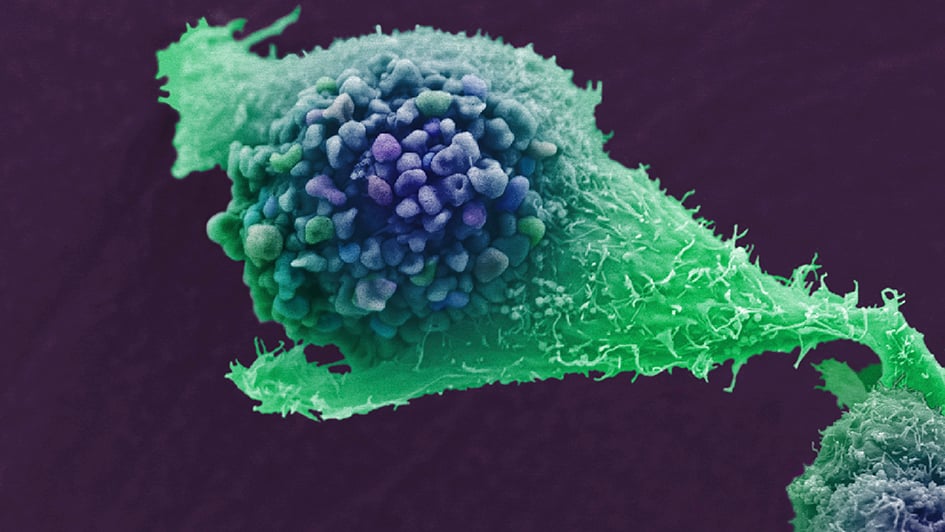
Image: scanning electron micrograph of a single prostate cancer cell
The Institute of Cancer Research, London, strongly welcomes the news that 177Lu-PSMA-617, a highly targeted radioactive drug, has been approved by the medicines regulator, the MHRA, for some patients with advanced prostate cancer.
The ‘search and destroy’ treatment seeks out tumour cells and precisely delivers a radioactive payload to kill them – causing less damage to healthy cells.
Patients in England and Wales who have previously received at least one targeted hormone treatment such as enzalutamide or abiraterone – alongside taxane chemotherapy – will now be eligible for the treatment. The next step will be for NICE to determine whether the treatment will be made available on the NHS.
Professor Johann de Bono at the ICR and The Royal Marsden NHS Foundation Trust co-led the phase III trial, VISION, which led to this approval.
Extend and improve lives
Presented last year at ASCO 2021, the findings showed that adding Lu-PSMA to standard care extended patients’ lives by an average of 4 months – to 15.3 months, compared with 11.3 for standard care alone.
Lu-PSMA specifically targets cancer cells by seeking out a protein called prostate-specific membrane antigen, or PSMA, which is present in high levels on the surface of cancer cells but not on healthy ones. When the drug makes contact, it delivers a precisely targeted dose of radiation to kill the cancer cells.
Men with higher levels of PSMA on their tumours are most likely to benefit from the targeted drug.
ICR scientists led on research which found that patients could be selected for the treatment using a test which identifies patients with genetic faults in DNA repair genes, and also showing that DNA damage increases PSMA levels on the surface of prostate cancer cells. The amount of PSMA on the surface of cancer cells was four times higher in patients with faults in these DNA repair genes – testing for these faults could indicate patients most likely to benefit from Lu-PSMA.
'Fantastic news'
Professor Johann de Bono, Regius Professor of Cancer Research at The Institute of Cancer Research, London, and Consultant Medical Oncologist at The Royal Marsden NHS Foundation Trust, co-led the VISION trial leading to the approval of Lu-PSMA. He said:
“Lu-PSMA represents a whole new class of treatment for advanced prostate cancer. It’s fantastic news that the MHRA have approved this cutting-edge treatment for eligible patients in the UK.
“This highly targeted, search and destroy treatment gives men with advanced prostate cancer another precision option which can help them live longer and with better quality of life. We hope that NICE will recommend Lu-PSMA for use on the NHS in England.”
Help us continue to find new ways to defeat prostate cancer – and improve the chance of survival for men with this disease. Please make a donation today.
Donate today